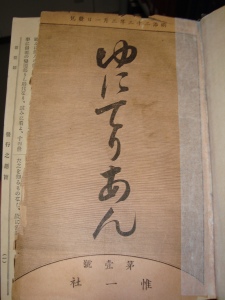Calling oneself a Unitarian-Universalist is the denominational equivalent of the opening scene in the original Star Wars movie, when the Imperial star destroyer flies over the camera and just keeps passing and passing for what seems like an eternity. But cheer up, because things could’ve been much worse: you might’ve ended up as a Unitarian-Puddingist. Then you’d not only have a long name, but an embarrassing one too. Believe it or not, “pudding” was an 18th century colonial American code word for Universalism. Here’s the back story:
Universalism has long been a heresy in the eyes of most Christians. Today, in North America, we enjoy a historically almost-unimaginable degree of religious tolerance, and so everyone is pretty much left alone to believe or disbelieve whatever they wish. But for most of American history (to say nothing of earlier times), it was socially unacceptable, even illegal to believe that God was loving enough to save all God’s children. Thus when people came to hold Universalist principles, they often had to keep them to themselves.
This is the situation in which Charles Chauncy, one of the greatest ministers of the 18th century, found himself in the 1750s. Chauncy was one of the stalwarts of colonial New England: he possessed a ferocious intelligence, deep scholarship, and the kind of elite social connections that made his voice impossible to ignore in theological matters. Yet when his study of the Bible led him to settle, to his surprise, on Universalist views concerning salvation, even he was obliged to keep it secret. He wrote a book on the subject, yet kept it hidden for the better part of thirty years.
In the meantime, a select number of his inner circle of colleagues were privileged to read or hear about the book. To keep Chauncy from being hounded out of his position by the bigotry of the Calvinist orthodox, the book was always referred to by the code term “the pudding.” Thus ministers “in the know” wrote to one another inquiring whether they had eaten the pudding, and how they found its taste if they had done so.
This actually went on for years, until finally Chauncy was obliged to publish the book as word of it leaked out and he was accused of being a Murrayite (i.e. a Universalist, a follower of John Murray, the founder of Universalism in America). To be a Universalist was terrible enough, but for Chauncy and his circle to be a Murrayite was even more shameful–they were strict opponents of Murray and his itenerant preaching of Universalism, which imposed on what they felt were their natural rights as the settled ministers of New England parishes, and stirred up emotional religious feeling, which the rationalist Chauncyites and their ilk disapproved of. Which is to say, their objections were mainly class-based; or, we might say, they were theological differences rooted deeply in class differences. Chauncy agreed with Murray on the matter of universal salvation by a benevolent God, but Murray’s was the wrong type of Universalism. This is a primary reason why Chauncy is usually written about as an ancestor of the Unitarians, rather than the Universalists, even though his views were just as firm on universal salvation as they were on anti-Trinitarianism.
Finally, in 1784 Chauncy served the pudding, titling it The Mystery Hid from Ages and Generations, Made Manifest by the Gospel-Revelation; or, the Salvation of All Men the Grand Thing Aimed at in the Scheme of God. He did encounter opposition, but less than he might have earlier. He had the advantage of publishing shortly after the end of conflict over a certain American Revolution, a time when people’s minds were naturally more preoccupied with matters other than theology. And he was very nearly at the end of his life, with conservative forces more interested in locking horns with rising stars of the Standing Order Left.
There is little doubt Chauncy would’ve been aghast at learning his spiritual descendants and those of Murray would one day join in union, and that few modern Unitarian-Universalists can even distinguish the taste of his pudding from that of Murray. But on another level he might have been pleased, because despite enthusiastically entering the controversies of his day when it seemed necessary, Chauncy and his liberal friends were great believers in Christian brotherhood and cooperation, including among groups with differing interpretations of Christianity. Which is to say, he disagreed loudly and often with his opponents, but always wanted to remain in conversation and fellowship with them. The Standing Order only disintegrated for good when the Calvinists slapped away the hand of friendship, ensuring a permanent rift between conservatives and liberals in American Protestantism, even though the issues of that day have long given way to other points of dispute.

